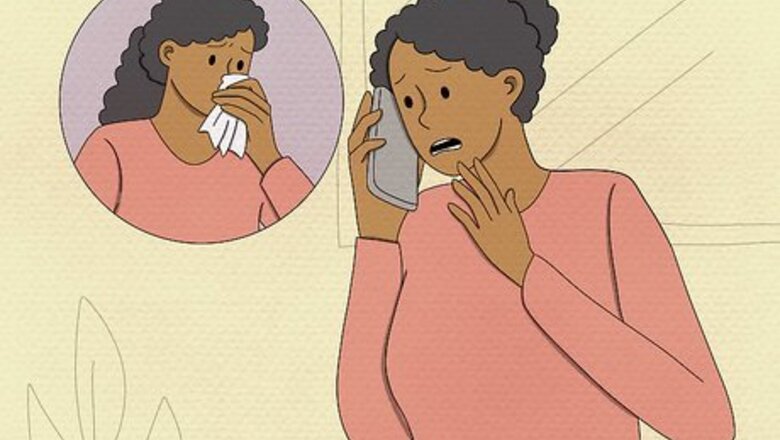
views
Taking a Sick Day
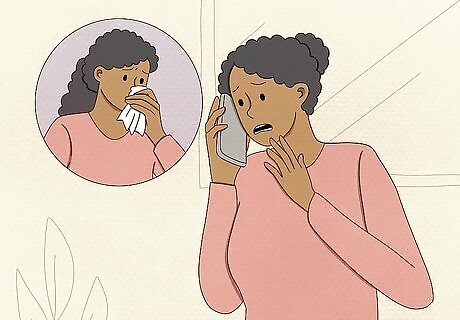
Call off on a day that won't raise suspicion. If possible, don't play hooky on the day you have your boring team meeting, or your boss might think you're trying to get out of attending. Calling off on a Friday or Monday might make them think you just want a long weekend. So try to call in sick on a random, uneventful day in the middle of the week so as not to raise your boss's suspicions: if you pick the wrong day to fake sick, it’ll be a lot harder to make a convincing case for yourself. Don’t fake sick right after you’ve had an altercation at work, or after you’ve done a lot of grumbling. You don’t want your boss to see your fake illness as an affront. Try to fake sick when someone else at work is or has recently been sick, or if it's flu season. That way your boss won't be too suspicious, since everyone is getting sick. Ultimately, though, call off whatever day you need. Don’t feel ashamed for needing a mental health day. Mental health days are as important as days we take to recover from being sick.

Choose a believable illness, and know it inside and out. You'll almost certainly be caught if say you have a rare flesh-eating virus. Stick to what you know and what your boss won't suspect. A safe bet is to pick a malady that's common and that you've had before, like a cold, food poisoning, or a migraine. Know the symptoms well, just in case your boss asks you about them. Some bosses are receptive to mental health days, but unfortunately, taking a day off for mental health can still carry some stigma. If you think your boss will be receptive, be upfront about your need for a mental health day. If you want to take off multiple days, pick an appropriate illness. A migraine or a bad case of gastroenteritis can get you off for two or more days, as they can last for a long time. Fake pink eye or strep throat if you need more days off. Whatever you choose, do your research thoroughly so that you can discuss the symptoms with clarity.
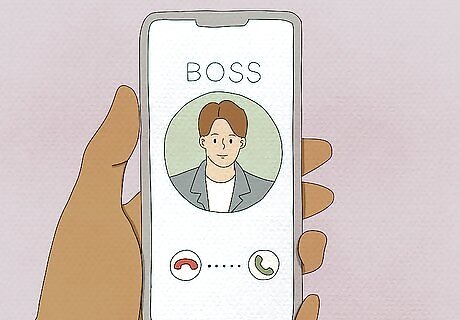
Let your boss know you’re not coming in as soon as you can. Don’t wait until after you’re already supposed to be at work to let your boss know you’re not going to be there. Contact them the evening prior or early in the morning of the day you want off. If you call early (or even in the middle of the night), you may be more likely to get your boss’s voicemail or to catch your boss when they're off guard and therefore more likely to let you off with no questions asked.
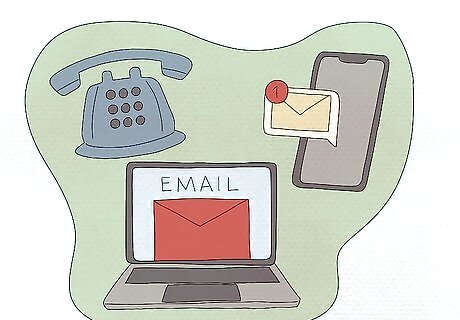
Call off over phone, email, or text depending on your company policy. Different work cultures and policies allow for more casual forms of communication, so use whatever form of communication your job prefers. While most employees call off over the phone, some companies are receptive to or even encourage text or email. Call off via text or email if you don't want to speak to your boss directly, and call them on the phone if you want to chat with them about your sick day, what you'll be missing, and when they might expect you back. Email and text are convenient mediums for calling off since no acting is involved. You can also email or text in the middle of the night, when your boss will likely be asleep. Talking on the phone gives you an opportunity to answer any questions your boss might have and perhaps even show off your acting skills. If you think you can pull off a fake illness over the phone, give your boss a call. If you call your boss after just waking up, your voice might be a bit husky, which will help you sound sicker.
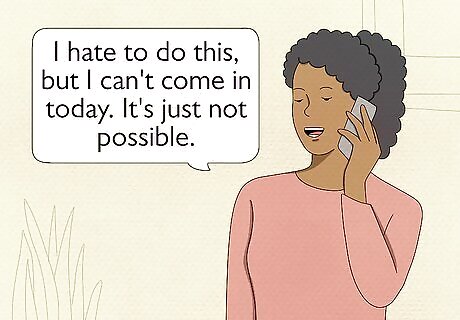
Keep the conversation with your boss short and to the point. Though knowing your “illness” well can help you feel prepared, remember that people often embellish when they are lying. Whether you're calling off over the phone, email, or text, don't get too detailed––just say that you're not feeling well and won't be coming in. If you're talking to your boss on the phone, be sure to act a little sick: sniffle or cough, and talk a little more slowly or softly to show that you don’t have your full strength. Open with a friendly greeting, but don't beat around the bush: try "Good morning, Li, I've got some bad news..." or "Hi Iman, I'm sorry to do this, but I've got to call off today...." Give just enough information for your boss to believe you, such as saying "I was up all night" or "I'm having awful stomach problems." Without being too obvious about it, make a point of showing how much you really hoped you would come to work: "I knew I should have said something at the end of the day yesterday, but I was hoping I would sleep this thing off.” Make it clear that your day off is a necessity, not a request: "I hate to do this, but I can't come in today. It's just not possible." Even if all you do is say, “I’m sick and can’t come in,” that’s usually good enough: most bosses won’t pry, unless you call off often.
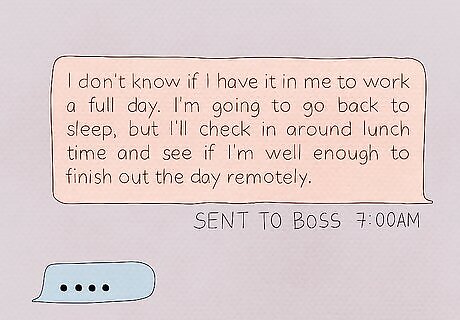
Communicate your availability during your day off. Depending on the sort of job you have and your reasons for calling off, you may be able to work from home or at least be on call if your boss or coworkers have questions for you about work you’re missing or anything else. When you reach out to your boss to let them know about your “condition,” clearly communicate your availability. "I just can't make it in today. But if it's all right with you, I'd like to keep working remotely." "I don't know if I have it in me to work a full day. I'm going to go back to sleep, but I'll check in around lunch time and see if I'm well enough to finish out the day remotely." "I'd like to get some work done today, but I'm just too under the weather. I should be able to respond to texts or emails if you have any questions, though." "I think it's best if I just rest for a day or two, but I'll be sure to update you with my progress."
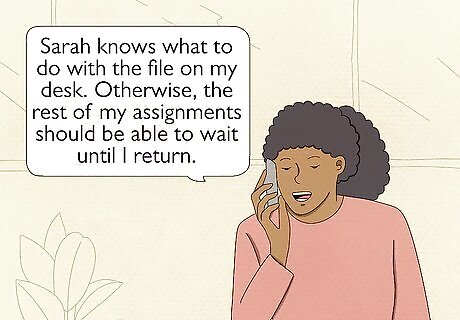
Create contingency plans and share them with your boss. If you’ve got projects to work on that day or meetings scheduled, let your boss know you’ve made arrangements to accommodate your day off. Prepping a contingency plan for that big assignment before letting your boss know you’re taking the day off will alleviate any stress on their end as well as make you seem dedicated to your job. "Sarah knows what to do with the file on my desk. Otherwise, the rest of my assignments should be able to wait until I return." "I already gave Ilya a heads-up that he'll be doing the presentation alone, but I'll make it up to him on our next assignment." "Julia said she can take over my shift today. I'll cover for her next week when I feel better." "I was able to reschedule my morning interview, thankfully, and Trieu said she can take over my afternoon meeting."
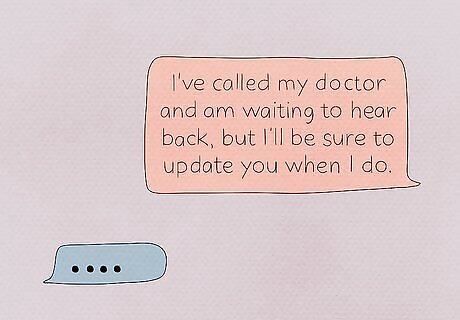
Be prepared for questions. Many bosses will respect your privacy, but they are legally allowed to ask questions about your condition as it pertains to your work. For instance, your boss might wonder how contagious you are or ask if you've tried everything possible to make yourself feel well enough to come in. The best policy is to preemptively say that you think you're contagious, and that you've tried every remedy you can to no avail. Consider mentioning you've called your doctor's office and are waiting to hear back on an appointment time. During peak cold and flu seasons, it may be several days before they could squeeze you in for an office visit. If your employer demands a note after you get back, you can always say your appointment isn't until later in the week. It gives you time to run to the doctor. "I've called my doctor and am waiting to hear back, but I'll be sure to update you when I do." "I think I've got the flu, based on my symptoms. The CDC recommends staying home for 4 or 5 days or until my fever breaks, so I don't think I should go back to work until then." "I shouldn't need to see a doctor since it's just a migraine: I get these every now and then, and I usually just need a day or two of rest. But I'll keep you in the loop!"
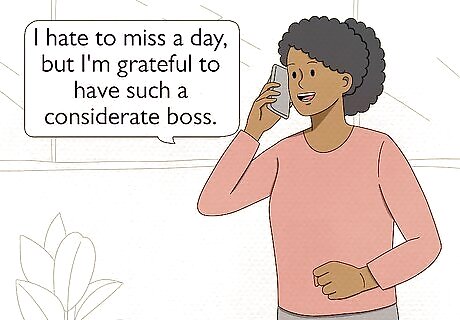
End the conversation on a good note. When you finish talking to your boss or writing your email, try to leave a positive impression as much as you can. Say that you’ll do your best to recover to come to work the next day, you’re grateful that your boss can be so understanding, and you’ll keep them updated on your progress. Make your boss feel like you’re truly sorry to take a day off instead of like you can’t wait to watch TV and ditch your job. If you’re willing to be disturbed during your fake sick day, you can say, “I’ll be in bed all day, so give me a call if you need me…” Only say you’re available if you think your boss will really be at a loss without you, and only if you really don’t mind being disturbed. A day off is supposed to be a day off. "Thanks for being so understanding, Martha!" "I hate to miss a day, but I'm grateful to have such a considerate boss." "Hopefully, I'll be over this bug and back to work in no time!" If you’re texting or emailing, end your message with a respectful signoff: consider “Thanks for understanding,” “Warmly,” or simply, “Best.”
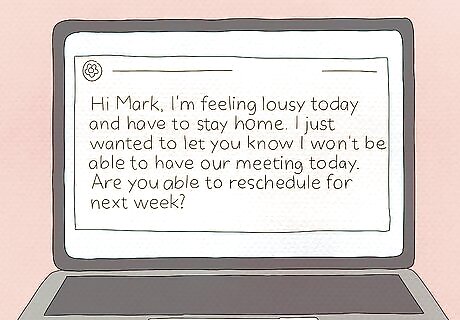
Give your coworkers a heads-up that you're out sick. If your day off will affect any coworkers—for instance, a colleague who might be collaborating on a project with you or a fellow employee who you’ve got a meeting with—shoot them an email to let them know you’re sick. You deserve a day off now and again, but try to make your absence as seamless for your colleagues as you can. "Hi Mark, I'm feeling lousy today and have to stay home. I just wanted to let you know I won't be able to have our meeting today. Are you able to reschedule for next week?" "Javier, are you able to cover my shift today? I'm so sorry to leave you in the lurch! I've come down with a bug and can't make it in, but I'd be happy to cover a shift for you in the future." "Good morning Sam, unfortunately I woke up with a migraine and won't be in for the next day or so. Would you by any chance be able to tackle my meeting this afternoon? I'd really appreciate it!" "Hey Amadi, I know we had lunch plans today, but I'm out with the flu and won't be able to make it. Rain check?"
Following Through
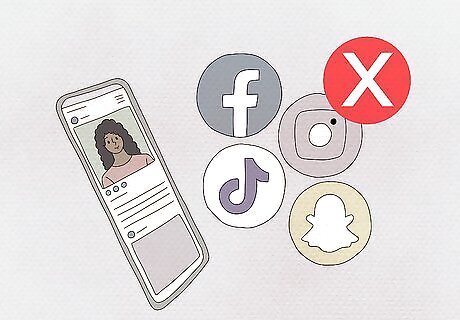
Don’t post about your hooky adventures on social media. Log off any social media sites that you might be tempted to visit on your "sick day." That way, your boss won't stumble over photos of you hiking in the middle of your supposedly debilitating illness or tweets that raise suspicions of good health. Only spend your sick day with people you know won’t spill your secret, and try to stay out of places where you might accidentally be seen by someone from work.
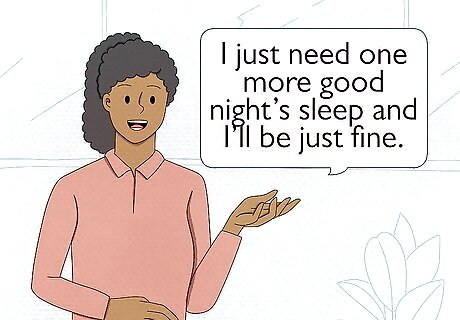
Act a little sick when you return to work. Don't walk into work after your sick day looking perfectly healthy. Make it seem like you're still getting over your illness. Blow your nose a few times or cough softly, but downplay it to be more authentic, saying something like, “I’m not feeling so bad anymore, really,” or, “I just need one more good night’s sleep and I’ll be just fine.” If you want to look extra authentic, don't get a lot of sleep the night before so that you show up to work looking haggard and exhausted. This bolsters your credibility for the next time you call in sick (and gives you an excuse to stay up late). Act a little more reserved that day. Don’t be extra friendly or chatty with your coworkers, and turn down invitations. Remember that you still need to save your strength.

Let your coworkers believe you were sick. You may think that you’re close with your coworkers and that they would never rat you out, but be careful about announcing that you were pretending to be sick, especially if any of your coworkers had to pick up your slack while you were out. If just one coworker repeats what you’ve said and it gets back to your boss, then not only will you get in trouble, but you’ll never be able to fake sick again. Furthermore, getting called out for faking sick will also make your boss more suspicious the next time you’re actually sick. You don’t want to have to defend yourself for the rest of your time at work.

Be friendly to your boss when you return to work. After calling in sick, be extra nice to your boss when you come back to the office. You don’t have to mention the illness, but maintain a good attitude and send positive vibes your boss’s way. Make them remember what an awesome employee you are, and don’t leave a shadow of a doubt in your boss’s mind that you might have been playing hooky. Be genuine with your appreciation: don’t gush too much, or you risk appearing phony. Just maintain a smile and engage in friendly chit-chat with your boss and your coworkers.
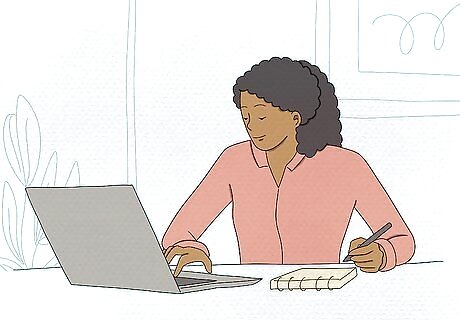
Put in a good day’s work. When you return to work from faking sick, put your best foot forward. Get to work on time, contribute to meetings, respond to emails promptly, and do anything else you can to ensure that you’re making a good impression. Calling off work can exasperate your boss, but performing well on your return will alleviate any frustration they may feel. It’s okay to fake sick every once in a while, but if you get into the habit of slacking off in general, then your job may be in jeopardy. Remember that you deserve an occasional day off to unwind, rest up, and rejuvenate your mental health. After a day off, you can return to the workplace re-energized and ready to roll!




















Comments
0 comment